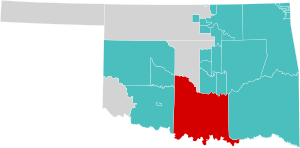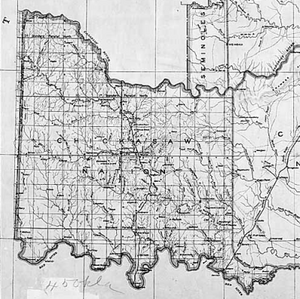Chickasaw Nation facts for kids
Quick facts for kids
The Chickasaw Nation
Chikashsha I̠yaakni' (Chickasaw)
|
|||
|---|---|---|---|
|
|||

Location (red) in the U.S. state of Oklahoma
|
|||
| Constitution | August 30, 1856 | ||
| Capital | Tishomingo, Oklahoma (Historically); now Ada, Oklahoma (1907-present) | ||
| Area | |||
| • Total | 7,648 sq mi (19,810 km2) | ||
| Population
(2010)
|
|||
| • Total | 38,000 | ||
| Demonym(s) | Chickasaw | ||
| Time zone | UTC−06:00 (CST) | ||
| • Summer (DST) | UTC−05:00 (CDT) | ||
| Area code(s) | 580, 405 and 572 | ||
The Chickasaw Nation (Chickasaw: Chikashsha I̠yaakni) is a Native American tribe recognized by the U.S. government. Their main offices are in Ada, Oklahoma. The Chickasaw people originally lived in parts of what are now Mississippi, Alabama, Kentucky, and Tennessee.
Today, the Chickasaw Nation is one of the largest tribes in the United States. Their land, or "jurisdictional territory," covers about 7,648 square miles in south-central Oklahoma. This area includes many counties like Bryan, Carter, and Pontotoc.
These counties are divided into four main areas: Pontotoc, Pickens, Tishomingo, and Panola. Each area has a similar number of people. The Chickasaw Nation now has over 70,000 members, with most living in Oklahoma.
In the 17th and 18th centuries, the Chickasaw were known as one of the historic Five Civilized Tribes. This group also included the Cherokee, Choctaw, Muscogee, and Seminole nations. They were called "civilized" because they had farming cultures and later adopted organized governments with written rules. They also learned to read and write, practiced Christianity, and took part in the market economy.
The Chickasaw language, called Chikashshanompa’, is part of the Muskogean language family. It was mainly spoken, not written, for a long time. Many important stories and traditions are passed down through spoken history from older generations. The Chickasaw and Choctaw languages are very similar. This has led experts to wonder about how the two nations first began.
The Chickasaw Nation has different family groups called "clans." These clans are part of two larger groups: the Imosak chá'a' and the Inchokka' Lhipa'. Each clan has its own leaders. The Chickasaw follow a tradition called matrilineal descent. This means children belong to their mother’s clan and are cared for by that family group.
Contents
History of the Chickasaw Nation
Early Encounters and Relocation
Hernando de Soto was likely the first European to meet the Chickasaw people in 1540. He found that they had a farming society with a well-organized government, their own laws, and religious beliefs. They lived in towns.
The Chickasaw lived in their homelands in western Tennessee and northern Mississippi for many years. But in the 1830s, the U.S. government pressured them to give up their land. The Chickasaw finally agreed to move west to Indian Territory through the Treaty of Pontotoc Creek.
During this time, known as the Indian removal, the U.S. government first gave the Chickasaw land in the western part of the Choctaw Nation. This area was called the Chickasaw District. It included several counties.
Later, the Chickasaw Nation became separate from the Choctaw Nation. This was agreed upon in the Choctaw–Chickasaw Treaty of 1854. The Chickasaw wrote their own constitution, which was signed on August 30, 1856. Their new capital was Tishomingo, which is now Tishomingo, Oklahoma. Cyrus Harris became the first Chickasaw governor. The nation had five main areas. Law enforcement was handled by the Chickasaw Lighthorsemen, who were like police.
Changes After the Civil War
After the American Civil War, the U.S. government made new treaties with the Chickasaw. This was because many of the Five Civilized Tribes had supported the Confederacy. Under the new treaty, the Chickasaw gave up more land to the United States.
Later, the Dawes Act changed how Native American nations were organized. The Chickasaw Nation's government was dissolved, and its functions were taken over by the federal government. The communal land, which belonged to the whole tribe, was divided into smaller plots for individual families. Any land left over was sold to non-Native Americans. This caused the Chickasaw Nation to lose much of its tribal land.
In the second half of the 20th century, the Chickasaw people began to rebuild their tribal government. They created a new constitution on August 27, 1983. This helped them manage their affairs and businesses again.
Chickasaw Culture
Language
Chikashshanompa’ is the main and official language of the Chickasaw Nation. It is over 3,000 years old and is part of the Muskogean language family. It is very similar to the Choctaw language. Over the years, fewer people have spoken Chikashshanompa’. Today, less than two hundred people speak it, mostly Chickasaw elders. In the past, students were often discouraged from speaking the language in school.
To help keep the language alive, the Chickasaw Nation of Oklahoma started the Chickasaw Language Revitalization Program in 2007. A key part of this program is the Master Apprentice Program. It pairs students who want to learn the language with fluent speakers. This helps students become good at speaking Chikashshanompa’. Other efforts include offering language courses at universities, creating a language-learning app, and starting youth language clubs.
Religion and Traditions
At the heart of Chickasaw religious beliefs is a supreme being called Aba' Binni'li'. This name means "the One sitting / dwelling above." Aba' Binni'li' is seen as the spirit of fire and the giver of life, light, and warmth. It is believed that Aba' Binni'li' lives above the clouds with other spirits.
The Chickasaw Nation traditionally follows a marriage system where one man marries one woman. The groom asks for the blessings of the wife’s parents, and a simple ceremony follows. Women traditionally arranged these ceremonies. Because the Chickasaws follow matrilineal descent, children usually take their mother’s family or clan name.
The Green Corn Festival is one of the most important ceremonies for the Chickasaw Nation. This religious festival happens in late summer and can last from two to eight days. It is a time for spiritual renewal and giving thanks. All tribe members thank Aba' Binni'li' for the year’s corn harvest. Important parts of the celebration include a fast, a purification ceremony, and the forgiveness of small mistakes. The Stomp Dance, a well-known traditional dance, and major ball games are also held during this festival.
Chickasaw Economy
The Chickasaw Nation runs over 100 different businesses. These businesses are in many areas, including manufacturing, energy, healthcare, media, technology, hotels, retail, and tourism. Some examples include Bedré Fine Chocolate in Davis, and the McSwain Theatre in Ada. They also own radio stations and many casinos.
The Chickasaw Nation focuses on providing services for its people. In 1987, they opened two health clinics and the Chickasaw Nation Medical Center in Ada. Since then, many more health facilities have opened. They even have a place for families and patients to stay near the medical center. This helps people who travel from far away save on costs.
The Nation also helps students go to college. Thirty years ago, they gave about $200,000 for higher education. Now, students receive over $15 million in scholarships and other support.
The Chickasaw Nation also plays a big role in Oklahoma's tourism. In 2010, the Chickasaw Cultural Center opened. It has attracted over 200,000 visitors and created many jobs. That same year, they opened a Welcome Center, a hotel, a travel shop, a conference center, and a chocolate factory.
In 2002, the Chickasaw Nation bought Bank2, which is now called 'Chickasaw Community Bank'. It started with $7.5 million and has grown to $135 million in assets. The Chickasaw Nation also runs many historical sites and museums, like the Chickasaw Nation Capitols. They own many casinos, including WinStar World Casino, and horse racing tracks like Lone Star Park in Texas. The Chickasaw Nation's economic impact in the region is estimated to be over $3.18 billion each year.
Notable Chickasaw People
- Bill Anoatubby, governor of the Chickasaw Nation since 1987
- Jack Brisco and Gerry Brisco, famous pro-wrestling tag team
- Jodi Byrd, writer and thinker about literature and politics
- Stephanie Byers, first openly transgender Native American person elected to public office in America
- Edwin Carewe (1883–1940), movie actor and director
- Jeff Carpenter, recording artist and co-founder of the Native American music group Injunuity
- Charles David Carter, U. S. Congressman from Oklahoma
- Travis Childers, U.S. Congressman from Mississippi
- Helen Cole (1922–2004), mayor of Moore, state representative, state senator, and aunt of Te Ata Fisher
- Tom Cole, U.S. Congressman, and son of Helen Cole
- Adele Collins (1908–1996), visual artist
- Hiawatha Estes, architect
- Te Ata Fisher, storyteller and actress
- Cyrus Harris, first Governor of the Chickasaw nation
- John Herrington, astronaut, first enrolled Native American to travel in space
- Linda Hogan, author and writer-in-residence of the Chickasaw Nation
- Overton James, Governor of the Chickasaw Nation (1963–1987)
- Douglas H. Johnston, Governor of Chickasaw Nation (1898–1902 and 1904–1939)
- Tom Love, businessman, founder of Love's Travel Stops
- Neal McCaleb, civil engineer and politician
- Bryce Petty, quarterback for the Miami Dolphins
- Piomingo, ally of the United States under George Washington
- Graham Roland, writer and producer
- Rebecca Sandefur, sociologist and winner of a MacArthur "Genius" Fellowship
- Eula Pearl Carter Scott, pilot, later elected to the Chickasaw legislature, where she served three terms
- Jerod Impichchaachaaha' Tate, composer and pianist
- Fred Waite (1853–1895), politician who served as a representative, senator, Speaker of the House, and Attorney General of Chickasaw Nation
- Estelle Chisholm Ward, educator, journalist, publisher
- Kevin K. Washburn, attorney, federal government official and law professor
 | Stephanie Wilson |
 | Charles Bolden |
 | Ronald McNair |
 | Frederick D. Gregory |




